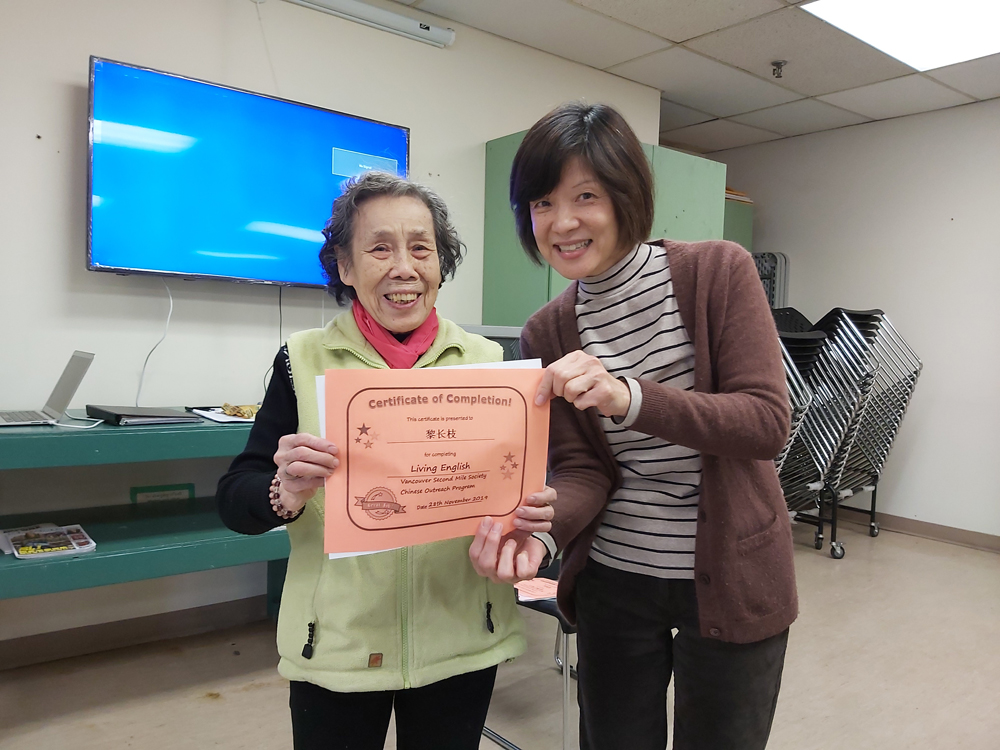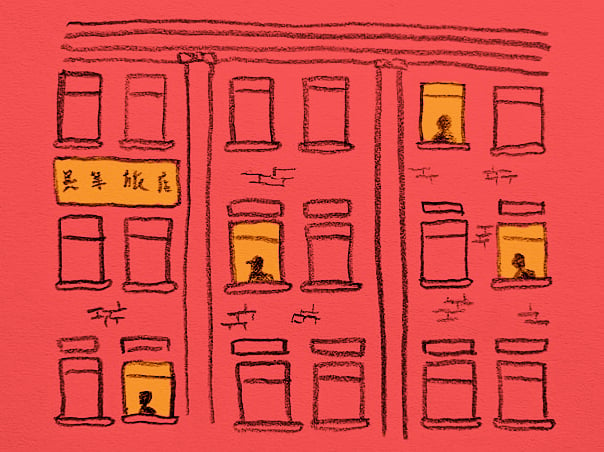Singing, dancing, qigong, English classes, volunteering at the library — Li Chang Shi, in her 80s, had a packed schedule before the pandemic hit.
Now Li, who lives with her husband on East Hastings at the edge of Vancouver’s Chinatown, is stuck at home, with all the activities cancelled.
“At home I can only sit or stand!” said Li in Cantonese. “But I found ways to move my hands.”
The couple lives in a building for seniors, where residents have been dutifully observing B.C.’s COVID-19 isolation measures.
Li is fearful of even venturing outside these days. Less than a block away is United Poultry, where an outbreak of COVID-19 resulted in at least 28 workers testing positive for the virus.
Li has two friends upstairs who haven’t been outside for over a month, so she is willing to occasionally host them at her place for games of mahjong.
“My husband watches a lot of TV shows, but I like to socialize,” she said. “I have friends everywhere: in China, Hong Kong, Singapore, the U.S. Every night I’m talking to them online on WeChat until midnight. We both sleep late so we can’t call each other out.”
People with an impression of Chinatown that’s stuck in the past — as the heart of Vancouver’s Chinese community or an exotic tourist destination — miss what the place means to residents like Li. To them, Chinatown is a cultural community of local shops, services and activities where they’re living out the last stage of their lives.
It’s hard to imagine a typical Chinese senior in Chinatown because there’s great diversity.
They might live in a non-profit building for seniors, like Li, or a housing co-op, a care home or a single-room occupancy building, some of which have shared bathrooms. The majority are women who may or may not have a spouse with them. Some have family locally, others don’t. They may have a landline, cell phone, TV, internet access — or none of those things.
Most don’t speak English well; they may speak Cantonese, a dialect of Cantonese or are part of a small but growing Mandarin-speaking population, many of whom are residents but not citizens and don’t receive pensions. This group makes use of the neighbourhood’s food banks and collects recyclables to resell for cash.
Amidst these differences, it’s the strong social connections in Chinatown that make it a happy and healthy place for seniors to live, with the comfort of familiar language and culture. The pandemic might be straining those connections, but it’s not breaking them.
For Li, a friend in her building from English classes helps pick up and deliver any items that she and her husband might need. Volunteers have also been dropping off bundles of produce. “Good stuff,” she says. “All the basics like choi, ginger, onions, apples and oranges.”

It’s been proven that during times of crisis, such as Chicago’s 1995 heat wave, social solidarity — caring for and checking up on one’s neighbours — saves lives.
But this is a pandemic, not a physical disaster, and maintaining connections for seniors who rely on in-person contact is difficult. Neighbours, shopkeepers, volunteers and community workers are working hard to help Chinatown seniors, a group that has struggled to tap into institutional support long before anyone heard of COVID-19.
Facing new challenges
It’s not just the pandemic. In March someone scrawled “bat soup” in graffiti on Main Street in Chinatown, evoking a racist stereotype claiming Chinese eating habits started the spread of COVID-19.
Vandalism in the neighbourhood has also gone up, but businesses go on, even at a time when much of Robson, the downtown destination shopping strip, has been boarded up. Many Chinatown essentials are still open: grocers, bakeries, barbecuers, dried goods stores and the Buddhist shop selling supplies like incense.
Building managers have become the de facto frontline workers; aside from new jobs such as disinfecting high-touch surfaces throughout the day, they’re also checking up on the health of seniors in their residences.
The pandemic has brought both isolation and fear.
“Even those who have a TV are feeling a little lonely right now,” said Doris Chow, co-founder of a volunteer group called Youth Collaborative for Chinatown.
“They don’t want to admit it, but in many cases they’re scared. Every death that’s happened has generally been a senior or someone whose immune system is already compromised, and there’s the outbreaks at senior homes.”
Before the pandemic, Chow’s group put on events like street mahjong to bring people together as they dealt with the pressure of neighbourhood gentrification in recent years. The pandemic has put that kind of programming on pause, ending everything from group outings hosted by the Carnegie Community Centre to casual hangouts in the common rooms of buildings owned by family and village societies, established during the 20th century to help newcomers.
Banquets and trips to local cemeteries to commemorate Qingming, a major Chinese holiday, were all cancelled, a major cultural disruption.
Seniors are “really feeling closed in,” said Wanda Ho, who co-ordinates the Chinese seniors’ outreach program at the Vancouver Second Mile Society.
“We’re starting to see mental health challenges in how they pass they day. They’re feeling hopeless, especially those who have chronic diseases. You will hear it from their conversations, saying things like long life is actually not a blessing. For us, shopping might be just a chore, but to them, it’s about their independence, and they’re feeling like they’re losing that.”
For Li and her husband, independence is exactly why they moved to Chinatown. When they first immigrated to Vancouver from Guangzhou in 2001, it was to help take care of their grandchildren in residential east Vancouver. “It was very quiet there,” said Li.
So when their grandchildren grew up, the couple moved to Chinatown, where everything they would need for daily life was close by — a common story for many of the neighbourhood’s seniors.
It’s a big shift for independent seniors to rely on others again for essentials.
For volunteers and service providers looking to check in on them, there are challenges to making contact.
‘When people are cheering... I’m thinking of the volunteers’
Wilson Liang, who’s been coordinating the Chinatown Seniors Friendly Mutual Aid Association for three years, has been educating seniors about digital devices, but the pandemic has made even phone calls difficult.
“Not every senior has a phone,” said Liang. “Some of them have a cell phone, but they’re on pay-as-you-go plans, not really for daytime use. So they’re counting every minute that they talk. It makes it difficult to stay in contact because they might not choose to answer to answer the phone if the number calling isn’t a family member. If it’s an unfamiliar number, they might not pick up.”
Nevertheless, helpers are persistently contacting seniors by phone or WeChat.
Ho’s team have been doing both, using the contacts to debunk the fake newsthat seniors are hearing as well as sending along coping strategies and Chinese translations of government releases. It’s crucial to provide the information, she said, because some seniors might only hear rumours, while those who hear too much of the truth could be burdened with stress.
Groups like Wanda Ho’s, along with new initiatives like Chinatown Care Packages, have been delivering groceries to seniors. Ho said they also learn about other requests this way, such as the need for medication or special items like shower chairs.
Chow has been organizing her youth network to call and help seniors too. One of them, who said to call her Ms. Lo, has been stressed by the few minutes of radio (she avoids the TV) she dares to listen to each day and is heartened by the care of Chow and her volunteers. Lo has received a delivery of masks and has had help getting her phone bill paid.
“I know they’re not trained nurses,” Lo told The Tyee in Cantonese, “but they’re just as important to my health as health workers. When people are cheering on the health workers at 7 p.m., I’m thinking of the volunteers.”
Emergency preparedness
A few seniors are still venturing out of their homes, and that’s left Chow feeling conflicted.
“I’ve spoken with a few seniors and they’re saying, ‘I’ve lived through the Cultural Revolution and famine, and this is just another thing we hope we can surpass,’” she said.
“It’s challenging because I think about public health and the safety of seniors, but there’s also this dignity piece in their last stage of life. We often want to protect seniors and infantilize them, but we as adults make choices and that’s part of being human. It’s a fine balance.”
Seniors are going out carefully and know to avoid crowds, Chow has observed, choosing to shop early in the morning or just before closing.
The pandemic has highlighted the worrisome reality of Chinatown for Chow: it’s not prepared for an emergency like this.
“There’s a great need to knowing where seniors are and how to connect with them,” said Chow.
While Chinatown does provide a place for many seniors to find their footing through independence and connection late in life, challenges of isolation, lack of family support and the inability to access government help still persist.
“Government support is in English and there’s often no translation available,” said Ho at the Vancouver Second Mile Society. “And during this crisis, they’re put in a really risky position where they could easily be forgotten.”
This is why Li, in her 80s, is learning English. She wants to be able to say the basics.
“I wanted to learn earlier to talk to my grandchildren,” she said. “But now, I really need to learn to be able to say where I live or if I end up in the hospital.” ![]()
Read more: Health, Coronavirus
















Tyee Commenting Guidelines
Comments that violate guidelines risk being deleted, and violations may result in a temporary or permanent user ban. Maintain the spirit of good conversation to stay in the discussion.
*Please note The Tyee is not a forum for spreading misinformation about COVID-19, denying its existence or minimizing its risk to public health.
Do:
Do not: